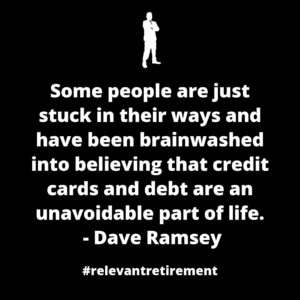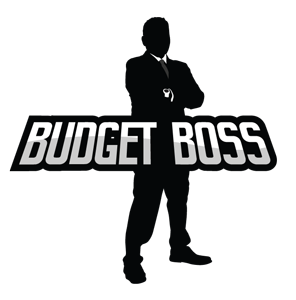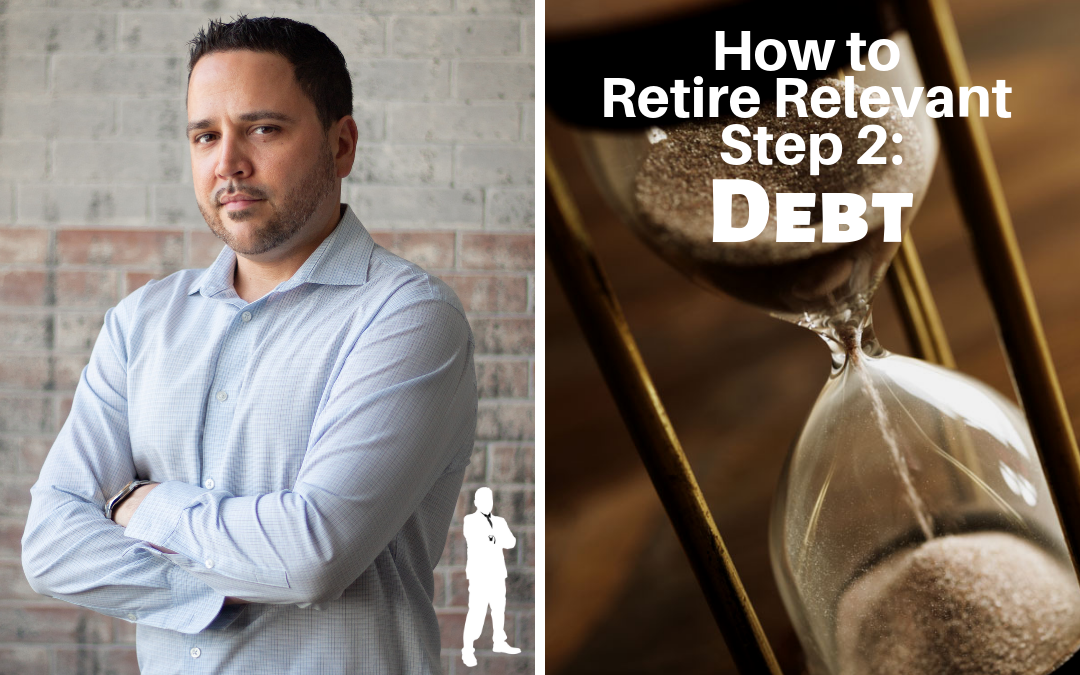Thursday, September 5, 2019
How to Retire Relevant Step 2: Debt
My 7 Step Relevant Retirement System encompasses many financial planning concepts. Step 1 was all about the Budget. As we move along, I will touch on housing, insurance, investments, and several other areas. Step 2 is all about debt. This step goes hand in hand with Step 1, the Budget. Much like the Budget, Debt Freedom is a lifelong endeavor. It MUST be taken seriously or literally nothing else will work. If you follow the financial gurus online or on social media, which I do avidly, you will notice a theme of debt freedom throughout. This is no accident. This is only not as important as Step 1, the Budget, for one specific reason. Not mastering the Budget leads to debt. Not mastering debt freedom leads to financial ruin. Budgets and Debt are like peas and carrots. You must win at one to prevent the other. In my previous post, I explained why the Budget was so important. I will assume you have read it, but if not here is the link. How to Retire Relevant Step 1: Budget
I am going to explain throughout this post why debt freedom is essential to your retirement success and why you will NEVER Retire Relevantly if you do not make it a priority. This concept is not a Budget Boss exclusive theory. This is a widely held industry standard. I have said it before many times, and I have even coined this phrase: There is no greater effect holding back the middle class of our society from achieving their financial goals than debt. It is the elephant in the room. It is the black sheep of the financial world. It ruins friendships, families, marriages, business partnerships, economies, political ideologies, and everything else in between. It almost ruined my life. I speak of debt, not as an economist or statistician. I speak of debt as a victim, the only thing is, being a victim implies someone did debt to me. The debt wasn’t brought onto me, I brought it onto myself. I also got out of it by myself and I believe this makes me uniquely qualified, along with my educational and workplace experience, to give advice on the subject. Let’s get started.
Debt Freedom as a Lifelong Priority
I am going to start this Step off with some deep, deep inner combat. In order for you to Retire Relevantly, you must hold being debt-free as a top financial priority. Over the past few decades, this mantra has slipped into the abyss. Phrases like, “If you aren’t in debt, you aren’t living,” or “There is good debt and there is bad debt,” have permeated our mainstream consciousness. I want everyone to fully understand why being debt-free is so very important and why staying debt-free is also very important. To fully understand this I believe we need to get to the root causes of debt. I believe there are 3 root causes of why debt is so common in our culture:
- Society (Meaning Lending Institutions, ie. Banks) have made acquiring debt easier and easier. They have done this because they realized that you having debt is actually more profitable for them than you being wealthy. Don’t believe me? Why do you think they keep raising your credit card limit even when you don’t carry a balance? Or why do you think they offer you overdraft protection when you have 10K in your checking account? Both of which have happened to me recently. They know that they can shave a portion of your income every month for the rest of your life at ridicules interest rates if they give you the “privilege” of being in debt to them.
- Society (Meaning the media, celebrities and big business) has glamourized consumerism. They have made it so you MUST have the new gadget. You MUST have a new outfit or hairstyle. You MUST get that car you “earned” or go on that trip you “deserve.” You aren’t fun unless you are drinking expensive cocktails or eating pricey meals. You aren’t good looking unless you have the right hair or the right shirt. You aren’t happy unless you can take a photo of yourself being happy somewhere else, usually exotic.
- We are ignorant. We are stupid and ignorant because we fell for it. We took our lack our financial literacy, thanks public education, and our desire to fit in, and made a life of debt-ridden nonsense. We know acquiring debt is bad and we did it anyway. We have no one to blame but ourselves because although to trap was set, we walked into it and no one forced us.
Because of this, a new mantra MUST be fulfilled. YOU MUST HATE DEBT. Hey Joe, don’t we all hate debt? Nope, nope we don’t. If we hated it like the way I am describing it, none of us would get into debt and all debt we have would soon be erased. If you truly, truly hate debt you will do anything to get out of it. If you truly, truly hate debt you will do anything, and I mean anything, not to get into it in the first place. This means get rid of the overdraft. This means cut up the credit card. This means payback you Aunt Alice the $100 you owe her. This means never, ever, ever, putting yourself in a position where debt is an option. Going back to Step 1 about the Budget being the base of a Relevant Retirement, you must create a MONTHLY SURPLUS. Every damn month. It is literally all about your mentality and your seriousness when it comes to debt. If you adopt this mantra, you will be successful with money. Period.
9 Reasons to Pay Off Your Debt – The Balance
Current Debts to Zero ASAP
While the majority of Step 2 in the 7 Step Relevant Retirement System is about mentality, priorities, and strategy, if you have debt there is a whole other obligation. You MUST make it priority number 1 to become debt-free of all non-mortgage debt with 3 years. In fact, you must take this step so seriously that all other money priorities take a back seat. I refer to the Dave Ramsey Baby Steps for this task. Dave has helped thousands, if not millions of people get on track financially. Step 2 of the Baby Steps is paying off all debt using the Debt Snowball Method. I will get into that method in just a moment.
I choose 3 years for this task for a specific reason. There are very few instances where you cannot get rid of your debt in 3 years maximum. How do I know this? Your debt level is predicated, for the most part, on how much income you make. What that means is you usually cannot borrow more money unless you make a certain amount of income. Banks don’t offer people who make 30K a year 200K lines of credit. Why this matters is that no matter your debt level, or income level, you will have to sacrifice to get out of your debt. The more debt you have, the more sacrifices you will have to make. The less money you make, the more money you will have to make somehow to get rid of the debt. In my experience, there is no level of debt that cannot be eliminated in 3 years or less with hard work and sacrifice. If you think you are the exception, feel free to DM me and explain your situation.
10 Tips for Paying Down Credit Card Debt – Budget Boss
The Debt Snowball Method
There are many ways to attack debt, but I find the Debt Snowball Method to be the most effective. The reason is simple: Momentum and Mentality. The Debt Snowball helps you build momentum through the very nature of it. Debts get arranged from smallest to largest with the smallest debt being the first to be attacked. After you have determined what you can put towards debt every month, refer to Step 1 the Budget, you apply that amount to the smallest debt making sure all the monthly minimums are paid on all the other debts. Once that debt is paid off you apply that amount to the next smallest debt until that one is paid off and so on. This process builds momentum and helps you develop the right mentality. Knocking out debt is all about being in the right state of mind. When using the debt snowball you get some quick wins and they breed confidence. Paying off debt is frustrating, so having the right attitude is key. Look at it like going to the gym. Most people fail in the first month because its painful and they don’t see results. Eventually, you get used to the pain and the results come. After that, you enjoy going because the dude in the mirror looks pretty damn good. The Debt Snowball is your sexy naked dude in the mirror, cheering you on as you knock out debt after debt. It is the most effective way to become debt-free. It is how I did it so I can vouch for its validity.
The Debt Snowball: How and Why this Method Works – Every Dollar

Controlling Triggers
I spoke a bit about how being in the right mentality will not only get you debt-free but keep you debt-free. Let’s jump into the latter for a bit. There are debt triggers all around us. We know about the financial institutions that don’t give a crap about us and the large companies trying to get us to succumb to their marketing ploys. Other triggers are a little more subtle. We have emotional triggers all around us, in the forms of friends and family. We MUST take control of the people around us that trigger debt accumulation. One example is the friend that you know you can’t go out with and not spend money. It could be pricey dinners out or fancy drinks at the local bar. You must have control of your budget and your debt so that these types of friends do not affect you. Sometimes it means losing friends. So be it. They need to be on board with your plans of wealth and if they are not it is probably because they are self-conscious about their own financial status. Family members are a bit tougher to crack, but they too must be neutralized. Your mooch of a son or deadbeat brother need to get their crap together and by supporting them you are only enabling them. Maybe suggest they take up learning about finance, so they don’t need your help anymore. I heard that Budget Boss guy is a good read… If you cannot control the negative money influences in your life, you are the only one to blame. Sorry, it is true.
9 Financially Toxic People to Avoid – Budget Boss
Debt No-No’s
Certain products are also debt triggers because they are designed to keep you in debt and make it extremely difficult to get out of it. A brief list of those include:
- Pay Day Loans – Why are these not illegal yet? The interest rates are absurd, and they perpetuate an endless cycle of debt. Avoid these at all costs.
- Home Equity Lines of Credit – There are very few people I would even consider one of these for. Why on earth would you make all the available cash in your home accessible with your bank card? The goal of owning a home is to ACTUALLY OWN IT! Making interest-only payments does not accomplish this and if your banker or financial advisor recommends a HELOC, run for the hills!
- Department Store Credit Cards – By signing up you now receive 5% off any purchases within the store. Oh, by the way, your interest rate is 10-15% more than normal credit cards. If the cashier recommends getting one of these at the checkout line, please smile and walk away.
- Online Shopping – I like the convenience of online shopping as much as the next guy but having subscriptions such as Amazon Prime have gotten way out of hand. Every day I come home to my apartment and see a package outside my neighbors’ door. If this is you, check yourself really quick. It has become an addiction for many people.
- Debt Consolidation Loans – There is a whole industry ripping people off with this terrible product. More often than not, the interest rate saved on these loans does not equal the extended period of time added to the payment period. This means that you may save interest and your monthly payment may be lower, but you extended the time period which makes it a wash. But sadly, it is not a wash because you have just prolonged the inevitable and by the way, the debt consolidation company bought your debt from your creditors for a fraction of what you owed. You are so nice for making them rich!
Are You Addicted to Debt? – Budget Boss
The negative effects of reverse compound interest
In Step 1 of the Relevant Retirement System, I explain the importance of creating a regular monthly surplus in terms of your cashflow. Having debt effects this surplus greatly. Beyond the actual paying back of the debt itself, the interest payments are literally a killer. This is what we call Reverse Compound Interest. I tout the praises of compound interest all the time. The idea of making money off your money, then off the money your money made, is quite appealing. Reverse Compound Interest is exactly the opposite. This is the interest that your debt generates and then compounds over time. This keeps you in debt longer and ruins your monthly cashflow. THIS is how the banks keep getting richer and the regular Joe, not me anymore thank god, gets poorer. I experienced the effects of this in my own life for a good chunk of it. Paying off credit card debt was a tall ordeal. I was throwing $1500 a month at it and after 6 months it had only gone down by $5,000. That extra $4,000 disappeared into the murky land we call bank profit. By carrying debt, you are hurting your monthly cashflow and thus, hurting your future and the future of those around you. It is the slow, and sometimes not so slow, drip of debt that will eventually come crashing down on you.
Download your FREE Combo Expenses Worksheet and get your monthly budget on track! – Budget Boss
Debt Prevention – Getting ahead of the beast
So, we know we must get out of debt, not now but yesterday. We also know we must hate debt and want to prevent it at all costs. Beyond mentally hating debt, how do we prevent it? There must be money involved somewhere right? Yes, yes there is. There are 2 ways to prevent any future debts. The first is quite simply the good old rainy-day fund, or as I like to call it, the emergency fund. I don’t care who you are, in order for you to Retire Relevant, you must have an adequate emergency fund. This is Step 3 of the Dave Ramsey Baby Steps. Here is why it is important. So many people I have met blame their debts on some random occurrence. The water heater broke and cost me $5,000 so that’s why the line of credit is maxed out at $25,000. My dog got sick, so I had to put it on the credit card. Suzie needed braces so we took out a loan from the bank. All these excuses can be prevented with a fully stocked emergency fund. CREDIT CARDS AND LINES OF CREDIT ARE NOT AN EMERGENCY FUND! Read that again, please!
Experts say you should have 3-6 months living expenses in your emergency fund. I take it a step further. Your emergency fund should be an ongoing fund you continually put money into every month. By making this fund a “bill payment” you have now opened the door for your monthly surplus to grow exponentially. Having too much money is a good problem to have. It gives you more to save, more to invest, and more ability to take advantage of opportunities. Start with the 3-6-month guideline, but don’t stop when you get there.
The other way you prevent debt is through insurance. Yes, insurance. It is not as sexy as cash, and in fact, it costs you money. Just like the warranty on your TV or fancy cell phone, it is there for a reason. All insurance is to you is the transfer of risk. Insurance companies assess the risk of something happening and charge you a premium to cover you for that risk. So how does insurance prevent you from going into debt? By having adequate insurance you now protect the things that could cost you a fortune. Home and auto insurance covers you from having to replace those 2 very expensive items should something go wrong. Disability insurance protects your source of income should you get sick or injured. Health insurance covers you from costly medical bills should health care be needed. Life insurance covers your loved ones should you die unexpectedly. Every single one of those occurrences has the potential to bankrupt you. In fact, there is no greater cause of people not retiring comfortably than health issues. They literally ruin people. While spending a little extra every month on insurance can be annoying, it is far less annoying than the alternative. I delve much deeper into this in Step 4 of the Relevant Retirement System which is all about Insurance.
11 Excuses to Not Get Life Insurance, and Why They Are BS – Budget Boss
Conclusion
This post was meant to piss you off. This Step is not fun, nor is it meant to be. When you look at retirement one of the last things you probably think about is debt. People always ask me, “What account should I put my money in,” or “what investment gets me the best return on my money?” While that stuff is important, it is not nearly as important as being debt-free. The reason is simple: TIME. Debt wastes your time and of course, your money. Spending months and years paying off debt is a complete waste of your time. It is why people don’t retire on time. It is why people never pay off their homes. It is why people end up living with their kids in retirement. It is how you get divorced and end up blowing a ton of money on that procedure. This step comes before investing because if you are in continuous debt, nothing else works. NOTHING. Be afraid, be very afraid. Then get mad. Then make a plan. Then, and only then, are you ready to retire wealthier than you can imagine!
“Some people are just stuck in their ways and have been brainwashed into believing that credit cards and debt are an unavoidable part of life.” – Dave Ramsey

Want to get rolling with my 7-Step Relevant Retirement System? Click here to Book your meeting with the Budget Boss!
Email – joe@budgetboss.ca
Follow Budget Boss on – Facebook LinkedIn Twitter Instagram Pinterest Quora

